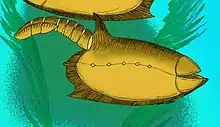Vetulicola cuneata
Vetulicola cuneata ("Wedged-shaped ancient dweller") is the type species of a genus of small, Early Cambrian deuterostome animals from the Chengjiang biota of China.
| Vetulicola cuneata Temporal range: Cambrian Stage 3 | |
|---|---|
 | |
| V. cuneata | |
| Scientific classification | |
| Kingdom: | |
| Phylum: | |
| Family: | |
| Genus: | |
| Species: | V. cuneata |
| Binomial name | |
| Vetulicola cuneata (Hou, 1987) | |
Description
V. cuneata has a body composed of two distinct parts of approximately equal length. The anterior part is rectangular in shape, and enclosed by a carapace-like structure of four rigid cuticular plates fused together, with a large, V-shaped mouth at the front end: there is a keel-like extension of the body wall on the top and belly. The tail-like posterior section is slender, strongly cuticularised and placed dorsally. Paired openings connecting the pharynx to the outside run down the sides. These features are interpreted as possible primitive gill slits. Vetulicola cuneata could be up to 7 cm long.
Lifestyle
It is assumed that V. cuneata spent most or all of its time swimming in the water column. Sediment found within the gut suggest that it was a deposit-feeder, possibly swimming to and from favorable feeding sites. Some specimens that had individuals of the putative entoproct, Cotyledion tyloides[1] attached to the terminal tail segment lead one researcher to speculate that V. cuneata lay buried in the sediment, with only its terminal segment exposed, but, nothing about its anatomy, or the taphonomy of its fossils, suggest that it was a burrower. Rather, it was more likely that larval C. tyloides would occasionally settle on the terminal segment, then take advantage of serendipity to feed whenever their host discharged nutrient-rich fecal matter.
References
- Zhang, Zhifei; et al. (January 2013). "A sclerite-bearing stem group entoproct from the early Cambrian and its implications". Scientific Reports. 3: 1066. doi:10.1038/srep01066. PMC 3548229. PMID 23336066.
- Butterfield, Nicholas J. 2003. Exceptional Fossil Preservation and the Cambrian Explosion. Integrative and Comparative Biology. 43(1):166-177. - URL retrieved June 22, 2006
- Dominguez, Patricio and Jefferies, Richard. 2003. Fossil evidence on the origin of appendicularians. International Urochordate Meeting 2003. Abstract at - URL retrieved June 22, 2006
- LUO, Huilin, FU, Xiaoping, HU, Shixue, LI, Yong, CHEN, Liangzhong, YOU, Ting and LIU, Qi. 2005. New Vetulicoliids from the Lower Cambrian Guanshan Fauna, Kunming. Abstract at - URL retrieved June 30, 2008
- Shu, D.-G., Conway Morris, S., Han, J., Chen, L., Zhang, X.-L., Zhang, Z.-F., Liu, H.-Q., Li, Y., and Liu, J.-N. 2001. Primitive Deuterostomes from the Chengjiang Lagerstätte (Lower Cambrian, China), Nature, 414:419-424. (November 11, 2001). Abstract at . - URL retrieved June 30, 2008
- Shu, Degan. 2003. A paleontological perspective of vertebrate origin. Chinese Science Bulletin, Vol. 48 No. 8 725-735. April, 2003. Abstract at - URL retrieved June 30, 2008
External links
- Biota of the Maotianshan Shale, Chengjiang China - URL retrieved June 22, 2006
- Palaeos' Page on Vetulicolia
- Photos of Vetulicola cuneata fossils - URL retrieved June 22, 2006